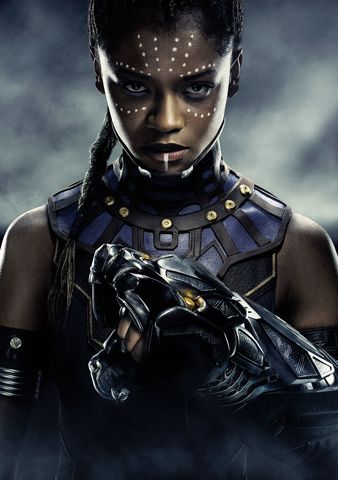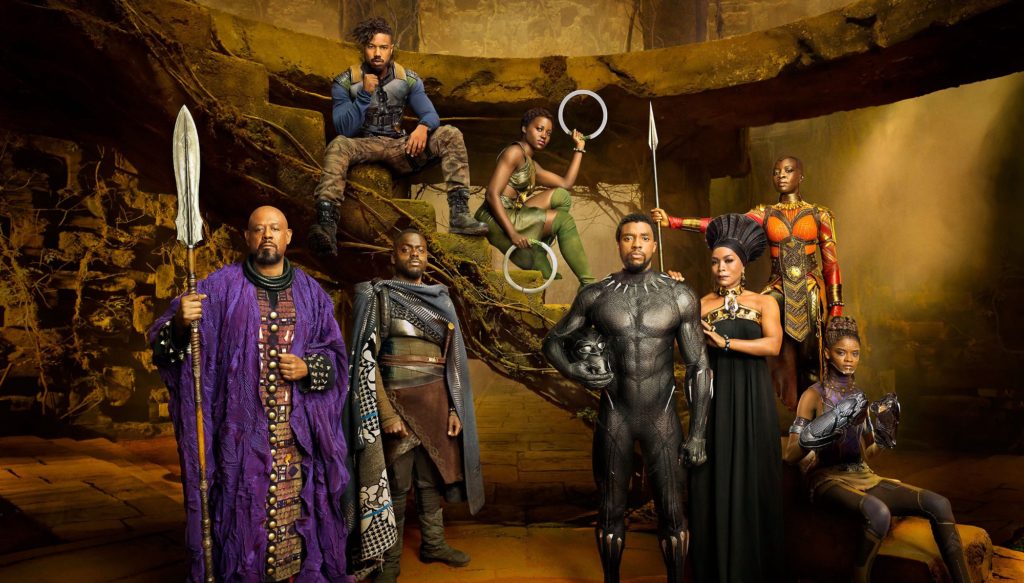Marvel has always toyed with politics and social unrest, though its macro issues never superseded its movie stars. Take your pick of any white superhero, toss in a swoonworthy movie star guy and voila! Audiences will queue up to see punches thrown, buildings annihilated and nefarious schemes thwarted. Yes, Black Panther has these surface-level devices as well, but along with them comes a politically charged tale that weaves in current injustices and institutional problems all viewed through an afrofuturistic lens. It’s without question the most provocative Marvel adaptation to date, and dare I say the most important.
Co-written and directed by Ryan Coogler (Fruitvale Station, Creed), Black Panther tells the story of T’Challa (Chadwick Boseman), a man who returns to his home of Wakanda to assume the throne after his father’s untimely death in Captain America: Civil War. A dazzling animated sequence introduces us to the magical Wakanda, a world that feels simultaneously fantastic, yet desirable and real. While not as surreal as Asgard, it’s an idealistic land of peace and technological advancements far beyond what the rest of the planet has seen. Wakanda is a landlocked nation in Eastern Africa that houses the world’s only supply of vibranium, the strongest known metal with potentially dangerous attributes. To protect its stash, Wakanda keeps itself hidden behind a beautiful mountainscape and magical holograms (thanks to its technological sophistication) which allows it to protect its precious metal, technology and citizens from outsiders hungry for power. But of course some of the vibranium gets into the wrong hands. We’ve got a movie to watch here, people.
For the first time in MCU history, the cast is almost entirely black. It’s written and directed by African Americans too, adding diversity and culture to a franchise historically steeped in whiteness. As Wonder Woman proved last year (along with the #OscarsSoWhite movements of years past), the need for representation remains dire. There’s an obvious consumer hunger for wider representation in film, and Hollywood is seeing numbers that prove it. Audiences clamored to see the powerful Diana, shelling out $821,847,012 worldwide, according to Box Office Mojo. Black Panther has only been in theaters for three weeks and it’s already banked (at press time) a whopping $763,392,346. Money may be the only way to make change in Hollywood, so hopefully these examples lead us down more diverse paths in film going forward. Even more imperative, though, is that young kids of all races and sexes will start seeing themselves represented on screen as powerful, able, important. Coogler’s movie magic will undoubtedly serve as a role model to millions of young black kids everywhere; this wider representation matters in more ways than I can even express. It’s long overdue.
 Admirably, Black Panther never marginalizes its female characters. Coogler delivered three dynamic women who don’t exist solely as a love interest, nor are they there to be saved by our hero. First, there’s Letitia Wright’s Shuri, T’Challa’s sister, who is the Q to his Bond. While she may reign as princess of the nation, she uses her smarts to design new technology for the country and clothe her King brother with the best defensive gear in the ‘verse. There’s no question that Shuri can go toe-to-toe with Tony Stark, both in terms of intelligence and quips, and dammit—let’s make that happen, Marvel! Then there’s Okoye (Danai Gurira), a traditionalist serving in the all-female special forces protecting Wakanda. Okoye is the fiercest of warriors, bursting with heart, dedication and love for her nation. When the throne is threatened by an outsider, Okoye continues to protect her nation despite her allegiance to T’Challa, a true parallel for many in the current American administration. Lastly there’s Lupita Nyong’o’s Nakia, Wakanda’s top undercover spy (and yes, T’Challa’s former lover, too). She fights for the rights of enslaved women and the oppressed, later helping T’Challa on a mission to stop the sale of stolen vibranium in South Korea. T’Challa’s power is sustained by the strength of these female characters, and he wisely and graciously relies on them for support. They are sexy, yes, and a couple of them do have romantic ties, but their love lives neither outweigh their power within nor define them. The film, as a whole, not only respects its women, but raises them up to be the best they can possibly be. This reprieve from the tired misogyny of superhero flicks would make even Diana of the Amazon proud.
Admirably, Black Panther never marginalizes its female characters. Coogler delivered three dynamic women who don’t exist solely as a love interest, nor are they there to be saved by our hero. First, there’s Letitia Wright’s Shuri, T’Challa’s sister, who is the Q to his Bond. While she may reign as princess of the nation, she uses her smarts to design new technology for the country and clothe her King brother with the best defensive gear in the ‘verse. There’s no question that Shuri can go toe-to-toe with Tony Stark, both in terms of intelligence and quips, and dammit—let’s make that happen, Marvel! Then there’s Okoye (Danai Gurira), a traditionalist serving in the all-female special forces protecting Wakanda. Okoye is the fiercest of warriors, bursting with heart, dedication and love for her nation. When the throne is threatened by an outsider, Okoye continues to protect her nation despite her allegiance to T’Challa, a true parallel for many in the current American administration. Lastly there’s Lupita Nyong’o’s Nakia, Wakanda’s top undercover spy (and yes, T’Challa’s former lover, too). She fights for the rights of enslaved women and the oppressed, later helping T’Challa on a mission to stop the sale of stolen vibranium in South Korea. T’Challa’s power is sustained by the strength of these female characters, and he wisely and graciously relies on them for support. They are sexy, yes, and a couple of them do have romantic ties, but their love lives neither outweigh their power within nor define them. The film, as a whole, not only respects its women, but raises them up to be the best they can possibly be. This reprieve from the tired misogyny of superhero flicks would make even Diana of the Amazon proud.
Coogler also details the reality and hardships that many young African Americans face through a backstory that unravels in Oakland, California. No spoilers here, but out of that cold hard truth of the streets sprouts Erik “Killmonger” Stevens (played by the impeccable Michael B. Jordan), a former U.S. blackops soldier wanting to usurp the Wakandan throne and live the life he feels he deserved. He wants to utilize Wakanda’s technological advances to help underprivileged nations everywhere no matter what the cost or what evil he has to accomplish along the way. Killmonger attempts to distribute the vibranium and weaponry of Wakanda in an attempt to disrupt white-dominated power and help all of his people who live beyond Wakanda’s protective borders. As a character, Killmonger helps the movie touch upon immigration and class division, issues our country still struggles to grasp and fix.
Killmonger becomes one of the most sympathetic villains the MCU has ever seen. His struggle and background are powerful and emotional. Though he conducts dastardly deeds on his journey toward power, he irrefutably makes some great points along the way. He’s lived a marginalized life since he was a boy and his childhood in Oakland led him to the violence and anger he has within. He wants to right the wrongs that have been done to him by his government, and yes, even by Wakanda. Killmonger shows us the other side of the coin, that the Utopian Wakanda cannot and should not squirrel its powers away for only itself to reap. He’s one of the most well-rounded villains ever, helping Black Panther dive deeper into America’s systemic dysfunction and corruption, holding a mirror up for viewers to face their own reality. (Do we really want to build a wall or should our nation be helping the less fortunate?)
Black Panther is one of the best, if not the best addition to hit the MCU. When Killmonger’s arc wraps up, we’re left disheartened by the state of worlds, both Wakanda and our own. The movie raises questions our own political system should be focusing on rather than opting for segregation, wall building and hatred. A mid-credits scene leaves us with hope, though. Coogler and T’Challa impart the audience with an undeniable message and emotional plea: We should do better.



